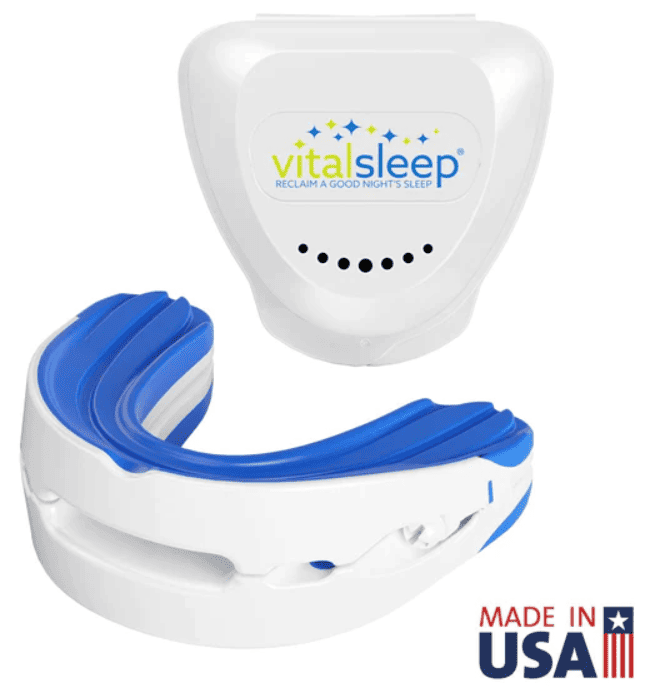Your mouth harbors various bacteria, and anything in frequent contact with it requires regular cleaning. Saliva production in your oral cavity increases the importance of maintaining cleanliness for oral devices even more. This is especially true about mouthpieces worn throughout the night.
They are incredibly helpful solutions for partner snoring or addressing your own sleep issues. Ensuring their cleanliness is crucial for mouthpiece effectiveness. Regular cleaning not only maintains hygiene but also extends their lifespan. In this guide, I will present the essential steps for maintaining proper hygiene and care for your snoring mouthpiece.
Key Takeaways
- Clean daily: Rinse with warm water after each use, and brush gently with a soft toothbrush and non-abrasive toothpaste.
- Deep clean weekly: Soak in mild dish soap or denture cleaner for 15-20 minutes, then scrub gently with a soft brush.
- Air dry completely: Never towel dry, as moisture traps bacteria.
- Avoid harsh chemicals: Stick to lukewarm water and gentle cleansers.
- Store it right: Keep the mouthpiece in a clean, dry, ventilated case.
- Clean the case too: Rinse the case weekly to prevent bacteria buildup.
- Regular cleaning is key: It extends the mouthpiece’s life, prevents oral health issues, and ensures optimal snore relief.
Table of Contents:
Why Clean Your Snoring Mouthpiece Regularly
Mouthpieces can turn your snoring woes into practical solutions. A study in The American Journal of Respiratory and Critical Care Medicine emphasizes that mouthpieces are better than other oral appliances to combat snoring.
However, if a mouthpiece isn’t cleaned properly, bacteria can accumulate and reduce its effectiveness. Regularly cleaning your snoring mouthpiece prevents health risks associated with bacterial buildup.
Using mouthpieces for snoring or sleep apnea can cause side effects like temporomandibular disturbances and tooth movements. Also, people drool when they sleep, especially with routine mouthpiece usage. The excessive saliva creates an environment conducive to bacterial growth, specifically if the mouthpiece isn’t cleaned regularly..
This accumulation of bacteria on the mouthpiece’s surface can lead to discomfort, oral infections, and potential oral health complications. If you don’t clean your mouthpiece often, it will turn yellow and even develop black spots, which could be mold growth. These side effects can be minimized by properly cleaning and maintaining the mouthpiece.
Ensure That You Use Only Proper Cleaning Techniques
Keeping your mouthpiece clean and effective requires more than just a quick rinse. Here’s how to ensure your mouthpiece stays hygienic and delivers optimal snore relief:
Daily Deep Clean:
- Brush it like your teeth: After each use, gently brush the mouthpiece with lukewarm water and a soft-bristled toothbrush (separate from your regular one). Diluted, gentle toothpaste can be used, but avoid harsh abrasives.
- Rinse thoroughly: Remove any toothpaste residue or debris with clean, running water.
- Air-dry: Skip the towel drying, as moisture can trap bacteria. Place your mouthpiece on a clean, dry surface to air-dry completely.
Weekly Deep Dive:
- Soak it up: Once a week, give your mouthpiece a refreshing soak. Mix lukewarm water with mild dish soap or a denture cleanser (follow the manufacturer’s instructions). Let it sit for 15-20 minutes.
- Scrub gently: Use a soft toothbrush to gently remove any stubborn residue. Focus on intricate areas like crevices and hinges.
- Rinse and repeat: Rinse thoroughly with clean water to remove all soap or cleanser residue. Repeat the soak and scrub if needed.
Bonus Tips:
- Avoid extreme temperatures: Don’t expose your mouthpiece to hot water, boiling, or direct sunlight, as this can warp or damage it.
- Store it smart: Keep your mouthpiece in a clean, dry, and well-ventilated case to prevent dust and bacteria buildup. Rinse your mouthpiece case once a week to keep it bacteria-free.
- Invest in quality: Only go for the best rated anti snoring mouthpieces, such as Vitalsleep. It is made with high-quality, BPA-free materials. The sleek design minimizes crevices, making it a top choice for optimal hygiene and snore relief.
Remember, proper cleaning is key to getting the most out of your snoring mouthpiece. By following these steps and choosing a well-designed option like Vitalsleep, you can rest assured knowing you’re getting a peaceful night’s sleep without disturbing yourself and your partner with loud snoring.

VItalSleep offers relief for even the loudest snores. Featuring an adjustable lower tray to advance the jaw up to 8mm, it ensures a tailored and comfortable fit with a simple boil-and-bite process.
100% MONEY-BACK GUARANTEE
Visit Vital SleepHow Often to Clean Your Mouthpiece
Cleaning your snoring mouthpiece regularly maintains its effectiveness and ensures good oral hygiene. It’s recommended to rinse the mouthpiece with warm or room-temperature water every time you take it off. Some manufacturers even suggest daily cleaning as part of your morning hygiene routine.
Bacteria keep accumulating on the mouthpiece if you neglect regular cleaning, inviting mouth soreness, tonsillitis, and other oral health issues. Irregular cleaning of your snoring mouthpiece can lead to bad breath from bacterial buildup, causing unpleasant odors. However, proper and regular cleaning significantly minimizes these issues.
Following the recommended cleaning frequency and instructions is essential to maintain the mouthpiece’s longevity and effectiveness. Failing to clean the mouthpiece regularly not only jeopardizes oral health but also diminishes the device’s efficacy in reducing snoring.
Avoid These Common Mistakes When Cleaning
- Say No to Abrasive Toothpaste: Avoid toothpaste with abrasive particles as they can scratch the mouthpiece’s surface, providing a breeding ground for bacteria and affecting its lifespan.
- Avoid Harsh Chemicals: Steer clear of abrasive cleaners, bleach, or alcohol-based solutions as they can damage the mouthpiece’s material or alter its shape, compromising its effectiveness.
- Skip Hot Water: Using high temperatures can warp the mouthpiece, affecting its fit and functionality. Stick to warm or room temperature water to prevent altering its shape.
- Rinse Thoroughly: Neglecting to rinse the mouthpiece thoroughly after cleaning can leave residue, potentially causing oral irritation or discomfort.
These measures ensure proper cleaning without compromising the device’s functionality or your oral health.
Conclusion
Mouthpieces can be used alone or in combination with other treatments to relieve snoring. Mewing helps with snoring by naturally strengthening the lower jaw, but devices like nasal strips or chinstraps can also help. But any method combined with mouthpieces will be ineffective if you don’t have proper cleaning habits.
A consistent cleaning routine not only prevents bacterial buildup and potential oral issues but also ensures the longevity and effectiveness of the mouthpiece. I have outlined the best mouthpiece cleaning tips and tricks here.

